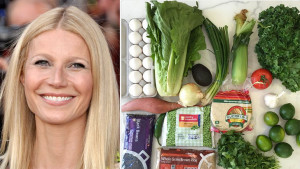
When I saw the graphic Gwyneth Paltrow posted of how much healthy food $29 would buy a person for a week, I nodded and thought, yep, a day and a half, maybe longer, is all my husband and I would get out of it. I understood that the picture was of healthy food because one of the huge problems that many don’t understand about people in poverty is just how little food of that calibre they can afford, forcing them to instead have to buy crap food like instant mac & cheese, or a listless and boring diet of rice and beans, and even those are not as cheap as they used to be.
But it seems, like with all things Gwyneth Paltrow does, pseudo-feminists writing for a spectrum of sites from Jezebel to Real Clear Politics immediately lambast her. How dare a rich person acknowledge poverty? Does she really think poor people eat kale? Or limes? She doesn’t care; she’s just engaging in “poverty voyeurism.” People who aren’t poor and on food stamps, working in social services, or self-righteous online critics, don’t have any right to make a comment. This is the gist of what all of these publications are saying, if you can even see those points through the sarcastic, insulting, condescending language surrounding such feeble judgments.
The level of outrage even the most innocuous gesture of Paltrow’s brings out in some of these (mostly) female writers is astounding and really more indicative of their nature than hers. From their theses (where they exist) to their language, what comes across to me is just how much they dislike Gwyneth for having an opinion at all, perhaps even for just existing. They dislike that she is rich and successful; they dislike that she is thin, that she has expensive clothes, that she has assistants, all of which are just extensions of hating her for being rich. Whether she’s right or wrong they tear her down, and with the most seething, sneering, snotty language a woman can employ against another woman.
This behaviour is not feminism, by the way. It’s just a bunch of bitches wearing feminist hats. It’s high school kids ripping apart the “popular girl” behind her back to feed their own low self-esteem, who hate someone because of what they have, infuriated with someone they keep trying to hurt yet who happily continues on with their lives unperturbed. It’s that most dangerous kind of human stereotype, the one that watches someone ever-so-closely for anything they can ridicule, and then takes great delight in doing so to its fullest extent.
I don’t like or dislike Gwyneth Paltrow as a person. I’ve never met her. I think she’s a great actress, and while I may not like all of her movies, I don’t believe that was something she personally owed me. She says some things I don’t agree with, but I’ve never heard her quoted saying anything with any venom at all, much less anything like the vitriol that is consistently hurled at her, presumably by people who also don’t know her. In interviews, she seems like a gentle, pleasant, kind person who speaks with genuine passion and courage about what she cares about, right or wrong.
In this case Paltrow made a point, and the SNAP challenge (wherein celebrities eat like they’re living on food stamps for a week) is bringing awareness of the plight of the millions of people who depend on food stamps each week. By making that point, and by participating in the challenge, Paltrow is also acknowledging the privilege she enjoys in her own life, which is for all intents and purposes a privilege that she earned.
In a viciously snarky article that starts with the mature statement, “Gwynnie P is down with the struggle, comrades,” she’s described as a monster for stating that she would rather (figuratively) die than eat cheese out of a can. Another article, written by another snide female writer for a pseudo-feminist publication, actually refers to Paltrow as a “broad,” which if I’m not mistaken, is one of the most derogatory of terms, originating from butcher’s parlance and meaning, “a piece of meat with a hole in it.”
As an aside, I have lived on less than $29 a week for food. It is awful. But I would also rather (figuratively) die rather than eat cheese out of a can, and most poor people can generally survive without doing so, unless they happen to like it. Not wanting to have to eat cheese out of a can, or any of the other things these women are mocking Paltrow for, does not mean that she cannot empathize with the plight of the impoverished.
As I am not a “celebrity voyeur,” I find it interesting that these pseudo-feminist critics describe Paltrow in misogynistic ways, choosing to judge her by her looks or her lifestyle over her considerable professional accomplishment. I had thought that Paltrow was renowned for her lifelong success as an extremely talented actress who has earned herself top honours for her work. I had thought this sort of success by a woman, who has built a public life for herself seemingly unencumbered by the suffocating weight of patriarchy, would be an inspiration for feminists.
And it is. For feminists. And if it’s not, then real feminists and mature people in general don’t waste their time bothering themselves about it, because whatever you have to say about Paltrow, she is categorically not anti-feminist and is therefore inoffensive to the cause.
– R.K. Finch
